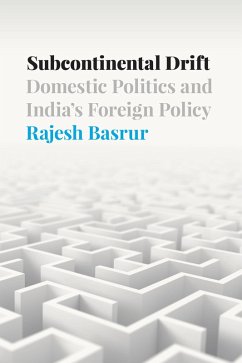How domestic constraints hamper India's foreign policy and its potential as a superpower
One of the most important developments in today's changing international system is the emergence of India as a rising power. However, Rajesh Basrur finds that India is hobbled by serious domestic constraints. Subcontinental Drift explains why India's foreign policy is often characterized by multiple hesitations, delays, and diversions that may ultimately hamper its rise.
Basrur analyzes the concept of policy drift through the lens of neoclassical realist theory to reveal why this drift occurs so regularly in Indian foreign policy and how it affects India's quest for major power status. Using four cases-the India-US strategic partnership, India-Sri Lanka relations, India's nuclear strategy, and crossborder terrorism-Basrur identifies two basic explanations for India's indecision on critical issues. The first, involuntary drift, is related to the distribution of domestic material power, while the second, voluntary drift, is produced by a responsibility deficit.
Basrur develops a fresh theoretical basis for understanding the relationship between India's foreign and domestic policies and introduces a series of theoretical refinements to neoclassical realism. Subcontinental Drift also provides advice on how policy makers might lower the costs of policy drift. This innovative analysis is essential to understanding the constraints around India's foreign and domestic security decisions and how they will affect its rise.
One of the most important developments in today's changing international system is the emergence of India as a rising power. However, Rajesh Basrur finds that India is hobbled by serious domestic constraints. Subcontinental Drift explains why India's foreign policy is often characterized by multiple hesitations, delays, and diversions that may ultimately hamper its rise.
Basrur analyzes the concept of policy drift through the lens of neoclassical realist theory to reveal why this drift occurs so regularly in Indian foreign policy and how it affects India's quest for major power status. Using four cases-the India-US strategic partnership, India-Sri Lanka relations, India's nuclear strategy, and crossborder terrorism-Basrur identifies two basic explanations for India's indecision on critical issues. The first, involuntary drift, is related to the distribution of domestic material power, while the second, voluntary drift, is produced by a responsibility deficit.
Basrur develops a fresh theoretical basis for understanding the relationship between India's foreign and domestic policies and introduces a series of theoretical refinements to neoclassical realism. Subcontinental Drift also provides advice on how policy makers might lower the costs of policy drift. This innovative analysis is essential to understanding the constraints around India's foreign and domestic security decisions and how they will affect its rise.
Dieser Download kann aus rechtlichen Gründen nur mit Rechnungsadresse in A, D ausgeliefert werden.









